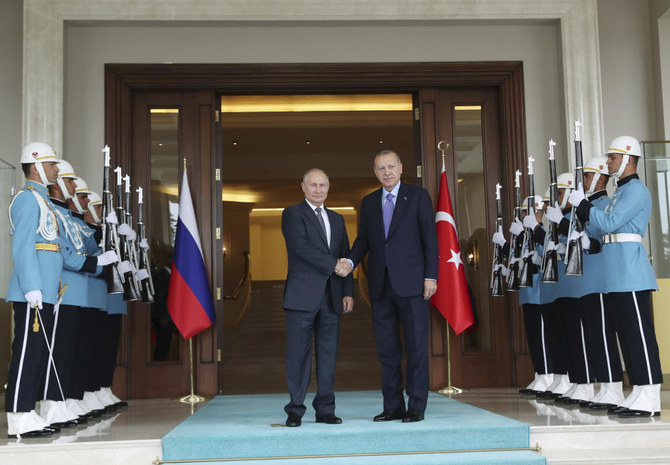ANKARA: The leaders of Turkey, Iran and Russia gathered in Ankara on Monday for the fifth trilateral summit on the Syrian conflict since 2017.
The Astana guarantor countries discussed the developments and peace settlement in Syria, with the last opposition-held bastion of Idlib, safe zone creation, the formation of the Syrian constitutional committee and the mass influx of refugees from Idlib toward Turkey as key topics.
“Turkey, Russia, Iran will carry the fight against terror to another level by eliminating terrorists in Syria east of Euphrates River,” Turkish President Recep Tayyip Erdogan said during the joint press conference.
About 2,000 militants from extremist factions, including Hay’at Tahrir Al-Sham, have illegally fled the Idlib and Hama governorates for Turkey since early May with European countries as the final destination, the Syrian publication Al-Watan recently claimed.
While Tehran and Moscow have been firm supporters of Syrian President Bashar Assad, Ankara mainly prefers his removal from the post and backed opposition groups.
Having 12 observation posts in the rebel-controlled enclave Idlib to implement a buffer zone, Turkey is concerned by the months-long advance of regime forces into the region with the aerial support of Moscow, and by the possible security risks such an advance has posed to its posts.
However, “security problems in northeastern Syria should be solved on the basis of protecting Syria’s territorial integrity,” Russia’s Putin said during the press conference.
Turkish President Erdogan recently threatened to open the doors to Europe for Syrian refugees if his country’s plans to implement a safe zone in northeastern Syria were not supported.
Max Hoffman, Turkey expert and associate director of national security and international policy at the Washington-based Center for American Progress, said that Turkey’s core interests and goals were at odds with those of the Assad regime and, to a lesser extent, Iran.
“Ankara wants to stop the regime’s offensive in Idlib to prevent further flows of refugees into their country, while Assad wants to eventually re-conquer all the areas controlled by rebels,” he told Arab News. “In the long-term, Turkey wants to maintain a zone of control within Syria to allow for the resettlement of large numbers of refugees, which Erdogan rightly views as a domestic political liability. Damascus views this as non-starter, and Iran is not happy about the prospect either.”
According to Hoffman, Turkey believes that only a political process to transition away from Assad’s rule will end the fighting, while Assad obviously rejects that premise.
“Russia and the Assad regime have already proven repeatedly that cease-fires and political agreements are not worth the paper they’re written on, while Turkey will have increasing difficulties controlling its rebel proxies as it proves itself unable to prevent their destruction in Idlib. Therefore, the stakes are quite high for both sides — particularly for Turkey, which faces strategic humiliation and potentially millions more refugees — but there are no grounds for fundamental agreement,” he said.
During the joint press conference, Iran’s Rouhani emphasized the 1998 Adana agreement between Turkey and Syria, saying that it could help to address the concerns of all parties. The counter-terror agreement was referenced before by Putin as well as a sign to encourage both sides to cooperate in Syria.
In a strategic rhetorical shift a day before the summit, Syria’s Foreign Ministry declared the Syrian Kurdish YPG militia-led Syrian Democratic Forces as “separatist terrorist militias” in a letter to the UN secretary-general — “a sign of readiness to cooperate with Turkey in eastern Syria” according to some experts.
Dareen Khalifa, senior Syria analyst at International Crisis Group, said that Turkey views the Astana and Sochi agreements primarily as a means to stop the violence while preserving a “de-escalation area” in northwest Syria under opposition control.
“While Russia during the meeting would want to focus on the constitutional committee, Ankara would be more inclined to discuss the Russian-backed military offensive in Idlib. Accordingly, Turkey agreed that “radical terrorist groups” should be removed from a 15-20 km “demilitarized zone” and on the broader need to combat terrorism,” she told Arab News.
However, Khalifa said, Ankara remains at odds with Moscow on defining “terrorist groups” operating in Idlib.
“Unless this disagreement over the definition of terrorist groups is addressed, any subsequent cease-fire will likely prove fleeting, and might jeopardize talks between Moscow and Ankara over other Syria-related issues including the formation of the constitutional committee,” she said.


























